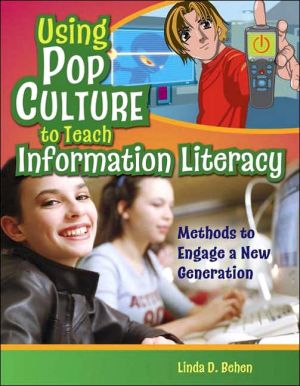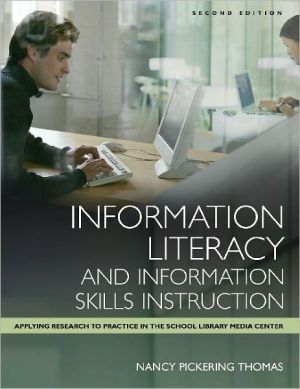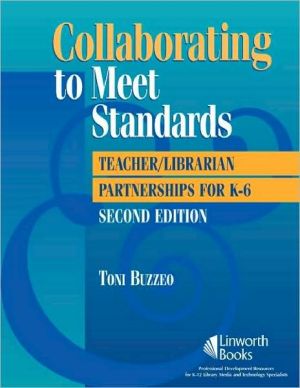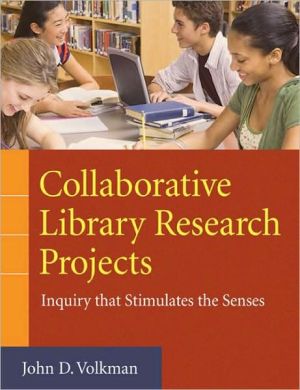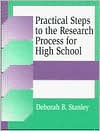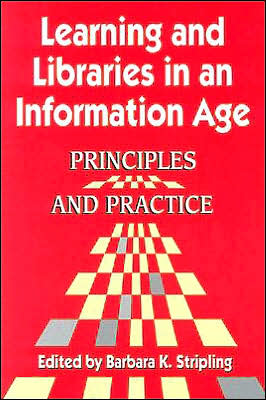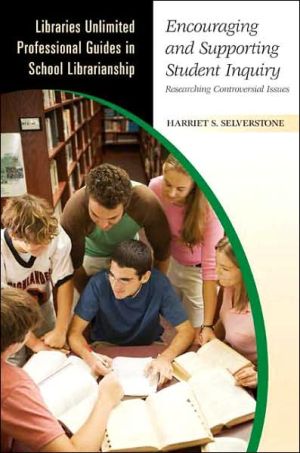Using Pop Culture to Teach Information Literacy: Methods to Engage a New Generation
Building on the information needs and the learning style preferences of today's high school students, the author builds a case for using pop culture (TV shows, fads, and current technology) to build integrated information skills lessons for students. Chapters include a rationale, a review of the current literature, and examples of units of study incorporating popular culture and technology.\ There is serious discussion in the media about today's youth, the Echo Boomers, and their connection...
Search in google:
There is serious discussion in the media about today's youth, the "Echo Boomers," and their connection with technology. Our high school students tell us that they have few meals with their families, that they want their teachers and their school's decision makers to listen to them and take their ideas seriously, and that they use the little free time they have to talk to or instant message with their friends or to play video games. Author and media critic Jon Katz says, "Technology is youth culture. These kids are building a revolution. Technology is part of their ideology, their language, everything they do." Building on the information needs and the learning style preferences of today's high school students, the author builds a case for using pop culture (TV shows, fads and current technology) to build integrated information-skills lessons for students. Chapters include a rationale, a review of the current literature, and examples of units of study incorporating popular culture and technology. Grades 7-12. VOYA Behen argues that the best way to effectively teach information literacy skills in the high school library setting is to make instruction relevant and fun by tapping into the interests of teens, particularly through employing pop culture. Behen shares the work that she has done over the past eight years as the Library Director at Saint Ursula Academy in Cincinnati, Ohio, through anecdotes and examples of materials from her program. A particular focus is given to creating games based on television shows such as Survivor, Amazing Race, and Who Wants to Be a Millionaire, while incorporating content from both popular culture and the curriculum of the school within the competitions. Although some of the early chapters are quite basic in the description of teen information behavior and will seem obvious to those who work with students regularly, Behen provides rich resources in later chapters as she outlines practical examples of activities and how she has built a school-wide program to provide a cohesive four-year approach to building information literacy in students at her institution. The book is written from a high school library perspective, but middle school library media specialists could easily adapt ideas for their student populations. This short, hands-on guide to information literacy instruction and programming is particularly well suited for those new to the field or experienced librarians looking to infuse some contemporary ideas into their programs.
IntroductionToday's Teens, Technology, and Pop CultureWhy Does Library Instruction Have to Be Fun?Finding and Using Pop Culture in Our Library InstructionPutting the Cool into Your Library: Inspiring This GenerationThe Big Buy-in from Administration and TeachersLife in the Real WorldWhat They Need To KnowBuild Your Information Literacy Instruction With Pop CulturePublicizing the Ultimate Library Program
\ From the Publisher"Clever….If your program is a curriculum, then this book provides some lively ideas for conducting a library school for teens."\ -\ Teacher Librarian\ "This book for high-school librarians presents a variety of ways pop culture can be used to teach information literacy skills. Arguing that library instruction should be fun as well as informative, author Behen suggests ways to incorporate reality TV, movies, sports, and more into a schoolwide information literacy and research program. She offers tips on creating cool facilities, services, and collections and building schoolwide support. A number of technology tips are worked into lesson plans. The distinctive nature of this book lies in Behen's emphasis on the information needs and learning preferences of students. Excellent ideas combined with readability and a light-handed approach should make it appealing to the target audience."\ -\ Booklist/Professional Reading\ "Using Pop Culture to Teach Information Literacy: Methods to Engage a New Generation is a concrete, hands on manual that gets to the nitty gritty of teaching teens information literacy. It offers numerous examples of power point presentations, lesson plans and even library publicity. This book would be especially useful for those librarians new to this field. It has short, easy to read chapters and discusses the various aspects of teaching information literacy."\ -\ Academia\ "It can be very difficult for high school librarians to find a connection with students of a very different generation. In Using Pop Culture to Teach Information Literacy, Behen demonstrates how to incorporate today's teen trends into our teaching style and make learning fun for students. Themes are designed around current pop culture television shows, and Behen gives examples of how to use these themes successfully with different grade levels and in different subjects….Helpful suggestions are included on how to encourage teachers and administrators to incorporate information literacy skills into lessons across the curriculum….Also included are helpful ideas for promoting the library program to both students and parents, including contests, workshops on creating Zines, and bringing in parents to show them how their children can make use of the the library and its resources. This book will help bring new life and interest into any secondary school library program."\ -\ Reference & User Services Quarterly\ "Behen represents a new age of librarians who believe in the strength of student-centered libraries and library-media programs and who embrace pop culture as a teaching tool for information-literacy development. She encourages media specialists to help teens evolve past basic hunting and gathering to think critically about their learning and information assimilation. The author suggests enlisting reality TV, movies, music, sports, games, literature, and teen hangouts as a framework for building library lessons. She offers ideas for turning the library into a cool destination, for seeking support and approval from administration and staff, and for getting started in a new forum. This manual is more of a brainstorming book than a resource full of applicable lesson plans; its strength is the research and advocacy it offers library media specialists who wish to embrace those topics that excite teens."\ -\ School Library Journal\ "The book is written from a high school perspective, but middle school library media specialists could easily adapt ideas for their student populations. This short, hands-on guide to information literacy instruction and programming is particularly well suited for those new to the field or experienced librarians looking to infuse some contemporary ideas into their programs."\ -\ VOYA\ "Throughout this discussion of the research process and the sample study course designed to integrate information literacy into the high school curriculum, Behen offers ideas on how to incorporate popular movies, music, sports, games, and reality TV into library lesson plans."\ -\ Curriculum Connections\ \ \ \ \ \ VOYA\ - Erin Wyatt\ Behen argues that the best way to effectively teach information literacy skills in the high school library setting is to make instruction relevant and fun by tapping into the interests of teens, particularly through employing pop culture. Behen shares the work that she has done over the past eight years as the Library Director at Saint Ursula Academy in Cincinnati, Ohio, through anecdotes and examples of materials from her program. A particular focus is given to creating games based on television shows such as Survivor, Amazing Race, and Who Wants to Be a Millionaire, while incorporating content from both popular culture and the curriculum of the school within the competitions. Although some of the early chapters are quite basic in the description of teen information behavior and will seem obvious to those who work with students regularly, Behen provides rich resources in later chapters as she outlines practical examples of activities and how she has built a school-wide program to provide a cohesive four-year approach to building information literacy in students at her institution. The book is written from a high school library perspective, but middle school library media specialists could easily adapt ideas for their student populations. This short, hands-on guide to information literacy instruction and programming is particularly well suited for those new to the field or experienced librarians looking to infuse some contemporary ideas into their programs.\ \ \ School Library JournalBehen represents a new age of librarians who believe in the strength of student-centered libraries and library-media programs and who embrace pop culture as a teaching tool for information-literacy development. She encourages media specialists to help teens evolve past basic hunting and gathering to think critically about their learning and information assimilation. The author suggests enlisting reality TV, movies, music, sports, games, literature, and teen hangouts as a framework for building library lessons. She offers ideas for turning the library into a cool destination, for seeking support and approval from administration and staff, and for getting started in a new forum. This manual is more of a brainstorming book than a resource full of applicable lesson plans; its strength is the research and advocacy it offers library media specialists who wish to embrace those topics that excite teens.\ —Jodi KearnsCopyright 2006 Reed Business Information.\ \ \
